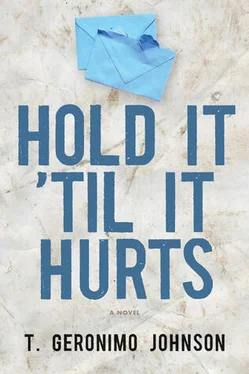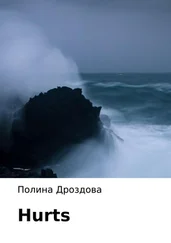The latecomer charged out, his stride victorious, holding a foam container aloft. “God is good.” He sat on the thin lawn at the edge of the circle of light, his back resting against the church, feet splayed out, sockless. Opening the container, he sniffed the mound of spaghetti and slice of white bread and smiled, nodding happily. The smile faded as he patted his pockets and poked at the food. He shrugged, and with two fingers began hurriedly scooping the pasta into his mouth, hunched over, holding the container close to his gut, one arm defensively curled around the food.
Wages poked Achilles in the arm and said, “I have Jack. Think about that.” He spun on his heels and went into the church.
Achilles thought about asking the man if he knew Troy, but changed his mind as he watched him dig his chin into his chest to slurp at a spot of sauce on his shirt. He was looking in the wrong place. What was he going to tell his mother? He’d said today was the day. For a moment he was transfixed by the image of her eyes, the thought of her alone in the house, most of the neighbors she once knew gone, all having sold out to the young DC commuters who thought Mrs. Conroy quaint with her slight Southern accent and vegetable garden.
Wages returned with a plastic fork. Before accepting it, the man regarded the utensil with suspicion, then surprise, then gratefulness, holding Wages’s eyes with his own, which were as deep with gratitude as if Wages had pulled him out of a raging river. He licked the fingers he had been eating with and wiped them on his pants. He shifted nearer to them, into the light. Scooting back so his butt was against the wall, he sat up straight with his arms at his sides and chest up, then crossed himself, brushed at his lap and, fork in hand, began to eat again, this time slowly savoring each bite. Humming, the man looked up and noticed Achilles watching. Licking his fork like a lollipop, he extended the container, making a motion to share. Achilles shook his head and turned to Wages. This was Wages the starfish. Achilles almost felt as if his friend had performed a miracle, but he didn’t understand why he felt that way. He was confused, but as proud and as full of admiration as he had been when Wages scurried out to the middle of Bi’hah Road to drag Merriweather back to safety, ignoring the sharp, hot whistles in the air and the small craters trailing him. He was equally afraid that, once again, he could not have seen fit to do the same thing, that if it had been up to him, Merriweather would have lost more than a foot. Achilles was not valiant.
But Wages wasn’t perfect either, he reminded himself. It was always Wages nipping at the bottle and keeping Achilles up, and complaining about Bethany but never confronting her.
Wages grinned and said, “I have Mark tucked away in the attic, in the trunk with your shit. You know I can’t let Nee-Nee see the pricey shit.”
Achilles’s mouth watered at the thought of the soothing burn of the murky, caramel liquor. He could feel the searing that started in his gut and worked its way out through his body until he felt light as a balloon. He was on the verge of agreeing to swallow the night when someone in a yellow do-rag and orange safety vest started yelling and waving at them from across the street. Achilles recognized the bouncing Africa medallion as Bud flung himself into the street, hobbling and hopping through the traffic, ignoring the horns. The rims of his eyes were red, the whites yellow.
Sweating, panting, heaving as though the mere act of crossing the street had exhausted him, he spoke in sharp bursts, “You said … you … was always there! Waited … for you … three hours! You said … always there!”
“I meant here,” Achilles tapped his cell phone.
Bud frowned. “Man it’s … too hot for games. Too hot for games.” He motioned for Achilles to step a few feet away, and, eyeing Wages suspiciously, whispered, “Who’s he?”
“What’s up with the vest?” asked Wages.
“Safety first at my age,” said Bud, then to Achilles again, “Who’s he?”
Achilles made a noncommittal gesture with his hand. “You’ve seen Troy?”
“You think I’m Stevie Wonder? I just called to say I love you?” When Achilles didn’t return the smile, Bud said, “I wouldn’t come if I didn’t know some-some. One hundred fifty bucks. Can you do it or not?”
“That’s not what I said,” said Achilles.
“Yes or no?” asked Bud.
“Of course. But, you’ve seen him?” Achilles voice was shaking. “How long ago?”
“Yes or no?” asked Bud.
“Yes,” Achilles said, almost yelling.
Wages stepped closer.
“Just a few hours ago.” Bud looked down, but cut his eyes in Wages’s direction. “He can’t come where we’re going.”
Achilles nodded. “Okay.”
“And I can’t go in with you. They’ll think I’m telling on people. So you go in alone. Alone, you hear? We drive by. I point it out. You drop me off ’round the corner. You go back and handle your business. And don’t mention my name. Roger?”
“Okay,” said Achilles.
“Okay then. Ten-four, like those truckers say. I used to be one.”
“Let’s do it,” said Wages.
Bud shook his head. “No way. Can’t do that. He’ll be snow in August. I’ll just come back.” Bud backed away.
“Wait!” said Achilles. He turned to Wages. “It’s cool. I know this guy from the church. This’ll be just a few minutes, then we’ll all meet back at your place.”
Wages studied Bud. The Africa medallion bounced off his chest as Bud hopped from foot to foot. “I don’t like it,” he said.
“I don’t like it,” said Bud.
They each spoke as if the other wasn’t there.
“He’s from the church. It’ll be cool,” said Achilles, adding under his breath, “I can handle this. Look at him.”
Wages relented.
“We’ll be there in no time. I know this city like a pair of titties,” said Bud as soon as he was in Achilles’s car. If it was possible, Bud’s breath was even worse than it had been in the diner. A humid mixture of onion and tooth decay flooded the car with every word. Achilles, who thought himself immune to smells, rolled down all the windows, which meant no AC. He floored it from corner to corner, red lights becoming stop signs, to force fresh air through the car, but he couldn’t expel the odor of stale beer and sweat, like an old bar, an odor that intensified with every wave of Bud’s arm. His funk was a larger body, a suit that pressed against Achilles, but what angered him was that it was unnecessary. This was America, land of running water and toothbrushes. Oblivious, Bud talked constantly, either giving directions or playing the part of the tour guide. He talked about Tremé and Storyville, the old red-light district, and Algiers, carnivals and krewes, ending each story with, “That’s right. I know this city like a pair of titties.”
Achilles nodded, not really listening.
“And I knows titties; snake charmers I call them. You better believe my snake’s done a lot of charming, too. I been here since the Mississippi was born, know that? I seen it all. Lived through the big one, Betsy. That was a hell of a hurricane, old Betsy, biggest we ever had. Pray they’ll never be another, but that was water off a duck’s back. Now, I knew a woman named Betsy — three in fact — but this one in particular damned near killed me. Damn sure nearly did.” His head drifted up in thought. “She was a looker, she was. Crazy, though, straight crazy. I wrote a song about her. You know John Lee Hooker? Took it. Sure did. “Whiskey and Wimmen.” That was it. I was singing that damn song — turn left here — in a truck stop in Florida. His thieving ass heard me. Took my idea. When he come out with ‘Serves Me Right to Suffer,’ I said, ‘Hell yeah it do!’ But, I don’t hold a grudge. Nope. Don’t hold no grudges. That’s one thing I like about me. Oh yeah, you know how it goes don’t ya?” Bud hummed a few bars, then broke into song. “ Whiskey and women, almost wrecked my life, almost wrecked my life. Wasn’t for whiskey and women, I’d have money today. Nightlife, nightlife ain’t no good, ain’t no good for me. I made a good start, but women and whiskey tore it down.”
Читать дальше












